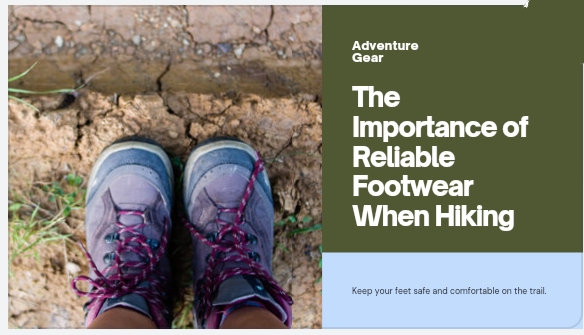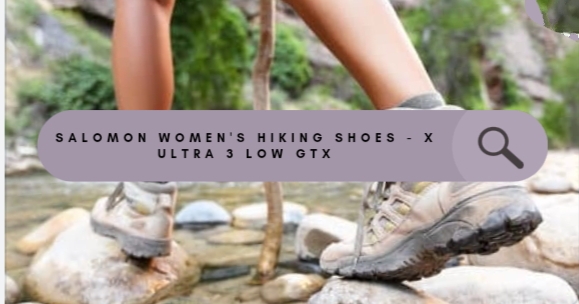For outdoor enthusiasts, hikers, and mountaineers, embarking on a new adventure comes with an undeniable thrill. However, hiking is a physically demanding activity that can pose a series of challenges and risks if not adequately prepared. One aspect often overlooked is the importance of reliable footwear. This post aims to emphasize why investing in good hiking boots or shoes is paramount, and how it can make the difference between an unforgettable experience and an uncomfortable trek.
The Value of Stability and Traction on Difficult Terrain
Hiking trails are often riddled with surprises. One moment you're ambling along a serene forest path, the next, you're ascending a rugged mountain slope. In the midst of these shifting terrains and fluctuating weather conditions, your footwear becomes your faithful ally. The role of reliable hiking shoes in providing stability and traction cannot be overstated.
Stability for Shifting Terrains: Whether you're negotiating rocky inclines or muddy trails, your shoes are the foundation on which your hike stands. Quality hiking shoes offer stability that keeps you firmly grounded, lessening the likelihood of slips, stumbles, or falls.
Traction on Tricky Surfaces: From loose gravel to slippery moss, hiking trails present a smorgasbord of tricky surfaces. High-quality hiking footwear is designed to offer maximum grip, preventing unexpected slides and keeping your journey safe and steady.
Adapting to Weather Changes: Rain or shine, your hike must go on. Reliable footwear resists water, dries quickly, and maintains traction even in wet conditions, ensuring you're prepared to face whatever Mother Nature throws your way.
The uncertainties of the trail can indeed be daunting, but with dependable footwear, every step you take is a confident stride towards your destination. While we can't predict every challenge that may come our way, we can certainly equip ourselves to navigate them effectively. It is clear that when it comes to hiking, the value of reliable footwear is firmly planted in the terrain of safety and assurance.
Ensuring Comfort Throughout Your Hike
Long treks demand not just stamina and strength, but also the necessity for your feet to be at ease. This is where reliable hiking footwear steps in, offering you the comfort you need to enjoy your adventure to the fullest. A good hiking shoe is built to cradle your foot gently, providing a cushioning effect that absorbs the impact of each step. This, in turn, takes a load off your feet, keeping fatigue at bay. Here's how quality footwear ensures you remain comfortable throughout your hike:
Shock Absorption: Hiking can involve pounding your feet on hard surfaces for hours. Quality hiking shoes come with cushioned insoles and midsoles that absorb this shock, reducing stress on your feet and joints.
Blisters and Calluses Prevention: Ill-fitted shoes can cause painful blisters and calluses that can cut your hike short. A reliable hiking shoe is one that fits like a glove, reducing friction and preventing these skin troubles.
Breathability: Hiking can make your feet sweat, creating a moist environment that can lead to discomfort and foot odor. Good hiking footwear is designed to be breathable, allowing moisture to escape and keeping your feet dry and comfortable.
So, as you gear up for your next hiking adventure, remember that your footwear can make or break your experience. Opt for shoes that are designed for hiking, ensuring a perfect balance between comfort, protection, and durability. Keep in mind, every step in comfort is a step towards an unforgettable hike.
Protecting Your Feet From Nature's Elements
As an explorer navigating the vast wilderness, your feet are constantly exposed to a variety of natural elements. It's your shoes that stand as the first line of defense, safeguarding your feet against potential hazards. Quality hiking footwear is designed to be tough, rugged, and resilient, acting as a protective barrier between your feet and the unforgiving outdoor terrain.
Guard Against Sharp Objects: While hiking, it’s quite common to come across sharp rocks, thorns, or broken branches. Reliable footwear is made with sturdy materials that protect your feet from these sharp threats and potential puncture wounds.
Insulation from Extreme Temperatures: Whether you're hiking in the scorching heat or the freezing cold, your shoes act as an insulator, protecting your feet from extreme temperature variations.
Blocking Hazardous Flora and Fauna: Poisonous plants, insects, and even some animals pose a risk to hikers. Durable hiking shoes help protect your feet from bites, stings, or irritations caused by these encounters.
Preventing Water Damage: A good hiking shoe is often water-resistant, keeping your feet dry even when you encounter streams or puddles, and preventing potential fungal infections or trench foot.
While it's impossible to completely eliminate the risks that come with exploring the great outdoors, you can significantly reduce them with the right equipment. In this context, investing in reliable footwear isn't just a choice—it's a necessity for safe and enjoyable hiking experiences. So lace up those boots, hit the trail, and let your shoes take care of the rest.
Promoting Foot and Ankle Health
The wellness of your feet and ankles is a crucial yet often overlooked aspect of hiking. Quality hiking footwear isn't just about instant gratification in terms of comfort and safety; it's about investing in your long-term foot health. Hiking in ill-fitted or inadequate shoes can lead to a host of issues that can take the joy out of your hiking adventures. Here’s how reliable footwear helps promote foot and ankle health:
Providing Arch Support: The significance of proper arch support cannot be overstated. Quality hiking boots or shoes offer ample arch support, helping to distribute weight evenly across your foot, reducing the risk of flat feet or other related problems.
Ensuring Ankle Stability: Hiking often involves navigating uneven terrains, which can put a strain on your ankles. Boots designed for hiking come with reinforced ankle support to prevent sprains or strains, ensuring your ankles are protected and supported.
Preventing Common Foot Problems: Prolonged hiking in unsuitable shoes can lead to a number of foot health issues, including plantar fasciitis, bunions, and corns. By opting for reliable, well-designed hiking footwear, you can significantly lower your risk of developing these conditions.
Thus, investing in quality hiking footwear is akin to investing in your foot and ankle health. So, remember to lace up the right pair of shoes before you set off on your next hiking adventure. The care you put into your footwear today will reward you with many more enjoyable hikes in the future.




.png)


